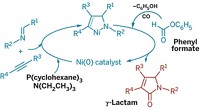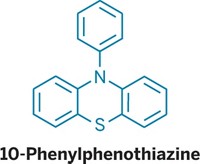Advertisement
Grab your lab coat. Let's get started
Welcome!
Welcome!
Create an account below to get 6 C&EN articles per month, receive newsletters and more - all free.
It seems this is your first time logging in online. Please enter the following information to continue.
As an ACS member you automatically get access to this site. All we need is few more details to create your reading experience.
Not you? Sign in with a different account.
Not you? Sign in with a different account.
ERROR 1
ERROR 1
ERROR 2
ERROR 2
ERROR 2
ERROR 2
ERROR 2
Password and Confirm password must match.
If you have an ACS member number, please enter it here so we can link this account to your membership. (optional)
ERROR 2
ACS values your privacy. By submitting your information, you are gaining access to C&EN and subscribing to our weekly newsletter. We use the information you provide to make your reading experience better, and we will never sell your data to third party members.
Materials
Thioimidates for fast and selective polymerizations
Organocatalysts provide more versatile approach for ring-opening polymerization of lactones and carbonates
by Stu Borman
August 1, 2016
| A version of this story appeared in
Volume 94, Issue 31
Researchers have found a new family of organocatalysts that promote rapid and highly selective ring-opening polymerizations of lactones and carbonates. Previous organocatalysts for ring-opening polymerization have been either fast or selective, but not both, according to Robert M. Waymouth and coworkers at Stanford University and IBM’s Almaden Research Center, who developed the new reaction (Nat. Chem. 2016, DOI: 10.1038/nchem.2574). The anionic thioimidate catalysts are generated by using an alkoxide to deprotonate a thiourea. Waymouth and coworkers note that the catalysts are bifunctional—they simultaneously activate the lactone or carbonate monomer and the growing polymer chain end. This mechanism accounts for the reaction’s high selectivity for chain formation, which leads to well-defined polymer structures with high melting points and narrow molecular weight distributions. Waymouth says the team is using the catalysts to generate oligomers for biomedical applications, and he speculates that similar bifunctional anionic catalysts might prove useful for other types of reactions.





Join the conversation
Contact the reporter
Submit a Letter to the Editor for publication
Engage with us on Twitter